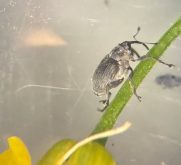Many species of insects, including a wasp commonly used for biocontrol in Canada, are at risk due to increasing dramatic temperature changes related to global warming.
Increasingly extreme swings in temperature may put some insects at higher risk than previously thought, according to a new study published today in the Proceedings of the Royal Society of London.
An international team of scientists tested the impact of temperature patterns on 38 species of insects and analyzed the results along with historic climate data and projections for 2050 to 2059. They found that when only the mean temperature rise is considered, insects flourished in the warmer environments. However, when accounting for the variation in highest and lowest temperatures, insects were negatively impacted.
Read Also

Tie vote derails canola tariff compensation resolution at MCGA
Manitoba Canola Growers Association members were split on whether to push Ottawa for compensation for losses due to Chinese tariffs.
From the Alberta Farmer Express website: Syngenta scientist casts doubts on neonicotinoid research
“This study changes the way we think about climate change vulnerability of plants and animals,” says study co-author Mary O’Connor, an assistant professor in the University of British Columbia’s dept. of zoology.
“Until recently, we believed that tropical species were more at risk of extinction because generally they cannot tolerate increasing temperatures. We also thought that many plants and animals in colder climates like in Canada could better tolerate warming,” says O’Connor, who is also associate director of UBC’s Biodiversity Research Centre.
“But when we add changes in daily and annual temperature swings to the mix, species in colder climates are in no better shape to weather climate change.”
O’Connor adds that species such as the stable fly Stomoxys calcitran and Muscidifurax zaraptor, a wasp commonly used for biocontrol in Canada, are among the species that would not benefit from warming, contrary to previous predictions.















